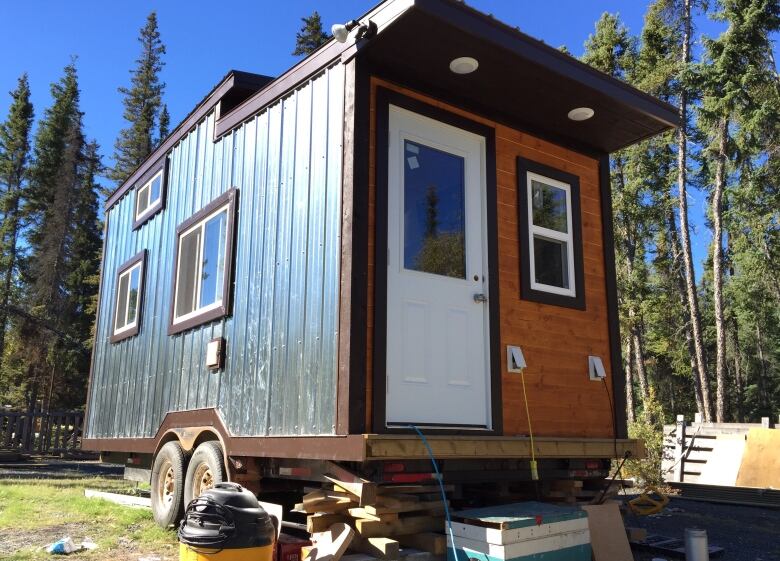Winnipeg mom hopes tiny house could give son new lease on life
Miniature homes growing in popularity, already used in U.S. by people living with autism

A Winnipeg mother wants to build a tiny house as a respite space for her son who is living with autism, after a year of fruitless searching to try to find a space that's suitable for him.
Amy Robinson said after watching several episodes ofTV that featured the homes, she decided one would be the perfect fit for her son Asher, who has very specific needs.
"Suddenly just one day I was just driving and kind of a light bulb went on and I thought, maybe that could work."
Asher likes to do what many 15-year-old boys do, including listening to music, going for bike rides and exploring. He's also a mastermind problem solver.
"He's a kid that can do a thousand-piece puzzle and does it piece by piece row by row, row by row, piece by piece and he doesn't try puzzle pieces to see if they fit he just knows which ones go."
Asher is also considered an extreme flight risk who doesn't have a sense of danger.
Robinson said he jumps out of windows and runs into traffic and train yards. Police monitor the boy with an ankle bracelet but finding a proper secure place for him to get care so Robinson can have a break has been a challenge.

She said the tiny house would act as a safe group home built for his needs but Asher would be the only resident in it and it would be staffed when he's in it.
The boy would be in the home a few days a month and the hope is it would make him have a space of his own that's special.
'His world is so little'
"His little world is still so little," she said. "He's not a kid who's able to go to other kids' homes."
Robinson said the home could go in her backyard and perhaps one day could become his permanent home when is an adult.
Tiny homes are growing in popularity across the country.
The miniature homes sell for a fraction of the price of a regular home and can be bought for between $50,000-$100,000 in Manitoba, said Anita Munn, co-owner of Mini Homes of Manitoba.
The homes are generally built on a trailer with wheels and are often, but not always, between 200 and 400 square feet.
Munn said most have sold for not more than $75,000 and $50,000 will get a buyer a one-bedroom main floor home that's 24 feet by 10 feet.
In the United States, some people living with autism have already moved into tiny homes with much success.
'A sense of independence'
The Madison House Autism Foundation, headquartered in Maryland, said tiny homes are an affordable option that can bring stability to a person's life, and prevent them from being shuffled around group homes.
That was the case for one man who lived in a group home till his mid-40s, said Desiree Kameka, the foundation's project lead, who works with the Autism Housing Network.
"It created a whole new sense of independence for him because this was now his home and he took care of it and he didn't have to have roommates," Kameka said in a phone interview.
"It improved his happiness."
Kameka said the homes make sense for many who live with autism because they can be custom-designed, are affordable and give residents a sense of ownership.
Robinson has received a quote of $70,000 and has started a GoFundMe for her son.
Corrections
- We initially wrote the name of Asher's mother as Amy Wilson. In fact, her name is Amy Robinson.Jul 10, 2017 9:10 AM CT
with files from Kim Kaschor












_(720p).jpg)


 OFFICIAL HD MUSIC VIDEO.jpg)
.jpg)



























































































